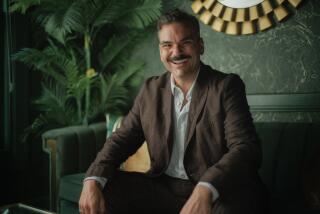Brash Image Consultant Is Aiming to Juice Up a Static Buzz Magazine
Behind the recent shake-up in the publisher’s suite at Buzz magazine is a brash image consultant from Brooklyn who’s helped sell the public on everything from luncheon meats to politicians.
Ned Kennan is evidently taking no prisoners in his quest to remake the flashy, money-losing publication. He won a showdown with Buzz Publisher and co-founder Susan Gates last month when she opposed his plan to create a diversified media company with stakes in television programming, book publishing and home shopping.
Gates quit, leaving Kennan free to pursue his ambitious strategy to leverage the 5-year-old magazine into a brand that stands for all that’s cool about Los Angeles.
“Buzz is Ned Kennan’s operation,” said Asia Inc. Publisher Peter Kennedy, a Hong Kong-based lieutenant to the Los Angeles magazine’s majority owner and chairman, Sondhi Limthongkul.
Kennan declined to comment, saying it is too soon to discuss his plans for the magazine.
Limthongkul’s decision last year to put Buzz in Kennan’s hands is another indication that he may be losing patience with his foray into U.S. publishing. Last year, sources said, representatives of Buzz met with their counterparts at Capital Cities/ABC Inc. and Rupert Murdoch’s News Corp. to explore any possible interest in Buzz. Nothing came of the sessions.
*
Asked about the meetings, Buzz Editor Allan Mayer said, “We’re always looking for investors.” He said the magazine is not for sale.
Kennan’s strategy to develop Buzz into a franchise isn’t a sure bet. It’s not clear that the public will accept Buzz as an expert on L.A. culture. Critics say the magazine fails to reflect the cultural diversity of the city and is not well-read.
“It is the trendy Westside-Malibu life, not the Los Angeles we live in,” USC journalism professor Bryce Nelson said.
A blend of celebrity interviews and Gen-X musings, Buzz has been likened to a stripped-down Vanity Fair. Though the magazine strives for a high profile, it hasn’t taken hold in Los Angeles.
A good chunk of the magazine’s 1995 circulation of 88,277 results from special deals. Twenty-six percent of its paid subscriptions are from hotels that buy copies at deep discounts and place them in rooms for guests, according to the Audit Bureau of Circulation.
“The circulation is fragile,” said a magazine consultant familiar with Buzz.
Buzz won’t say how much money it takes in from advertising. The number of ad pages increased 22% for the first nine months of 1995 compared with the same period in 1994, but several restaurant advertisers received free ads in return for catering Buzz events.
What has helped Buzz survive is weakness on the part of its most important rival, Los Angeles magazine, which is trying to shed its image as an uninspired catalog of restaurant listings. Los Angeles magazine has seen its paid circulation drop 15% to 145,583 since 1990, according to the audit bureau. The situation could change now that Walt Disney Co. owns it; Disney purchased the magazine’s corporate parent, Capital Cities/ABC.
Kennan isn’t known for work with publishing companies, though he is familiar with crisis. Past clients include defunct junk bond underwriter Drexel Burnham Lambert and Rep. Richard A. Gephardt (D-Mo.) in his failed 1988 presidential bid. As a partner with a Washington consulting firm named Quo Vadis (Latin for “Where are you going?”), Kennan is currently an advisor to Avon Products Inc., assisting the cosmetics company with its entry into South Africa. He has also been an advisor to Hormel Foods Corp., the meat packer.
With his bushy gray beard, earthy language and fondness for unfiltered Gitanes cigarettes, the fiftysomething Kennan cuts an unconventional image. A veteran spin doctor, Kennan specializes in using opinion research to shape PR.
Kennan relishes contact with CEOs; a former colleague said Kennan once boasted that the chairman of defunct Data General Corp. “couldn’t brush his teeth” without speaking to him. In the consulting business, he is known for his intelligence and flamboyance; former associates said it isn’t unusual for him to bring focus group participants to tears in an attempt to divine what they think.
Kennan can be blunt. According to “Highly Confident,” a book by Jesse Kornbluth about Michael Milken, Kennan warned client Drexel early on that it had become a “one-product company” dependent on junk bond trader Milken, whom Kennan described as a “borderline schizophrenic” with “an enormous drive that impels him to be at the front of the crowd.”
Milken dismissed the analysis, as did his firm. He later pleaded guilty to six federal felony counts stemming from an insider-trading scandal.
A source close to Gates says Kennan was equally direct with her, demanding Gates’ resignation during a meeting at Los Angeles International Airport as he prepared to leave for Bangkok, Thailand, where Limthongkul’s $500-million publishing empire is based. Mayer and Buzz President Eden Collinsworth, co-founders of the magazine with Gates, attended the airport meeting, the source said. By the next day, locks had been changed at Buzz’s West Los Angeles offices and stunned employees had been cautioned not to contact Gates.
“Of course I did,” said a defiant Buzz employee. “The whole thing was ridiculous and insulting. Susan isn’t a criminal.”
*
Gates declined to comment for this article. Sources close to her say she believed the new ventures proposed by Kennan would distract Buzz management from the magazine at a time when it was losing money and needed attention.
Collinsworth, who introduced Kennan to Limthongkul last year, said the partners were “in agreement” with Gates’ resignation.
Mayer, her successor as publisher, declined to comment when asked if Gates had been forced out.
“I know this sounds like PR . . . but Susan was a friend and I am really sorry,” Mayer said. “Without her, the magazine would not have gotten off the ground.”
The question for Buzz is whether it can remain aloft. Anxious to boost advertising revenue, it began publishing restaurant listings and shopping tips. Buzz plans to publish a travel guide later this year and distribute copies as newspaper inserts in the New York Times, a tactic that puts the magazine’s rebellious image further at risk.
Kennan is taking the magazine down a bolder path, creating a company to be called Buzz Enterprises, with an eye toward building Buzz’s image as an expert on L.A. It would be the parent of the magazine and any new enterprises developed in partnership, which are said to include TV programming, book publishing and home shopping financed with help from as yet unnamed partners.
“If you have a stand-alone magazine like Buzz, there’s only two ways to make it,” Mayer said in an interview in December. “One is to sell out to a large media company and become one of a string of magazines. The other is to try and create a whole solar system of entities that derive their reason for being from the core” publication.
More to Read
Sign up for our Book Club newsletter
Get the latest news, events and more from the Los Angeles Times Book Club, and help us get L.A. reading and talking.
You may occasionally receive promotional content from the Los Angeles Times.






